In many cases when you are charged with a crime, you may notice that there are also a number of other, similar charges against you. These additional charges are known as lesser included offenses.
You may ask, why am I being charged for multiple crimes following a single incident? For example, if you are charged with the class A misdemeanor of assault in the third degree (PL § 120.00), you may also be charged with the class B misdemeanor of menacing in the third degree (PL § 120.15), and the violation of harassment in the second degree (PL § 240.26). If you were charged with driving while intoxicated, you may see that you were charged not only with the misdemeanor of driving while intoxicated under VTL 1192(3), but also with the traffic infraction of driving while ability impaired under VTL 1192(1).
Why include lesser offenses?
These lesser included offenses can be beneficial to the prosecution, the defense and the jury. Having them on the list of charges against you means that you may be able to plea to or be found guilty of a less serious charge, and receive a lighter punishment. In cases where the jury may believe that you have committed some crime, but not as serious a crime as what you were originally charged with, they have the option to convict you of a crime that better fits the actual evidence.
Ultimately, the addition of lesser offenses allows flexibility for pleas and convictions that better suit the actual crimes of the case. It gives juries more options for conviction; prosecutors more options to plea bargain; and defense attorneys more chances to avoid mandatory punishments, and work towards resolutions with less collateral consequences.
Can I be convicted of all of these charges?
If you find yourself charged with lesser included offenses in addition to the top charge, a jury will first consider the most serious charge in your case. If the jury finds you guilty of this first charge, they will not consider the lesser included charges for a decision. If the jury, however, finds you not guilty of the first, most serious charge, then they will decide whether you may or may not be guilty of the lesser included charge.
How does this affect my sentence?
You will only be sentenced on the most serious charge you are convicted of. In situations where you are charged with both a misdemeanor and a violation, this could mean the difference between a having a clean record or not. A misdemeanor is considered a crime, and will appear on your criminal record if you are found guilty. A class A misdemeanor is punishable by up to one year in jail, and a class B misdemeanor is punishable by up to 90 days in jail. A violation, however, is not a crime, and most are dismissed and sealed after a year.





You must be logged in to post a comment.